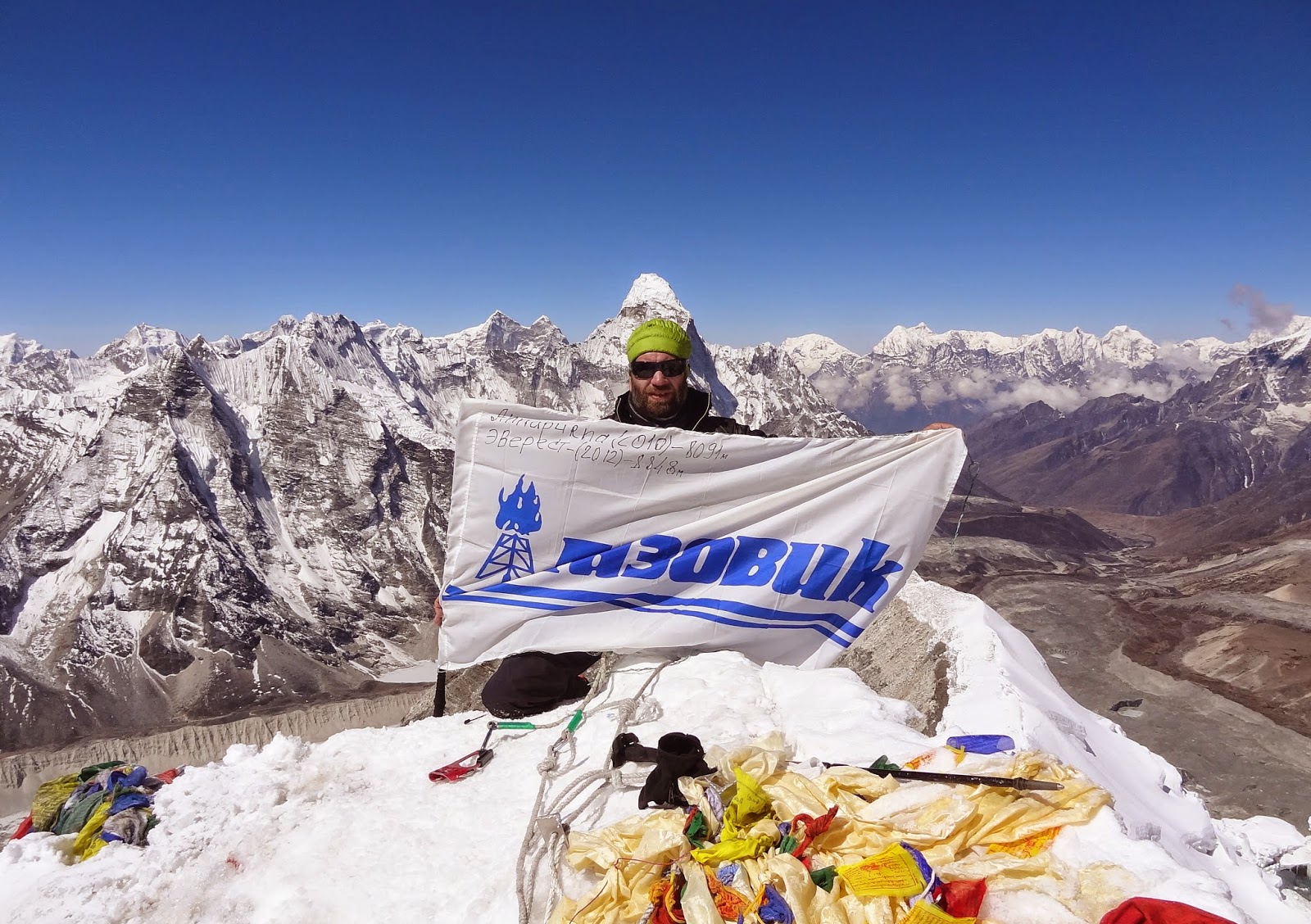Physical training
For some reason it is considered that before preparing to Everest it is important to train oneself. I don't know how is it properly, but the change of my familiar lifestyle has touched mostly the drinking of alcoholic beverages: since the 1st of January I have reduced its consumption approximately 5-10 times. Now I drink about as much as can drink the citizen, who do not fall under the definition of an alcoholic. Concerning physical training, historically the active lifestyle in general is usual for me: bycicle riding in summer, skiing 2-3 times a week in winter, two-hour hiking all the year round and every day. Taking into account that I'll need an endurance, I started to ski for the long distances - 25-30 km. Not long ago I even tried my powers for the distance of 50 km. What is good in Saratov - it is the fact, that you can ski almost until the end of March.
The long-term visiting of the 'World Class' sports club was discontinued a couple of years ago to have the time for Wushu which I practiced for six months then. Before the ascent of Everest I decided to recommence visiting the gym (twice a week), now at "Forte Club', and also for hiking now I take a backpack (17 kg - light weight, 3 hours / 23 kg - heavy weight, 2 hours) every 2-3 days.
To the question of a purpose again
It is interesting to analyse the differences between the statements of common people, who have been in the mountains, and the statements of mountaineers. When explaining the reasons of what drove them to climb the mountains, the common people mention the following things:
To the question of a purpose again
It is interesting to analyse the differences between the statements of common people, who have been in the mountains, and the statements of mountaineers. When explaining the reasons of what drove them to climb the mountains, the common people mention the following things:
- a love for the mountains, romance;
- a hard challenge, an opportunity to exhibit bravery, inaccessible in ordinary life;
- a noble risk, a challenging goal, sometimes even performing some kind of a “mission”.
At the same time the same people tend to ascribe to the other mountain climbers (even who effect an ascent, using the same routes) completely different motives:
- unbridled vanity;
- an excess time and money to be spent;
- selection of simple well-trodden routes, where even a beginner would pass;
- an escape from everyday life (wife, real problems, work, etc.)
In contrast to common people, mountaineers don't make differences in assessment of their own actions and actions of other mountaineers, double standarts are not so strongly pronounced.
In general, an ascent of Everest is a highly selfish act. If the person says, that he dedicates the ascent to the woman he love, to his children, to his job - think, if it's good for the woman he love, for his children, for his job (2 months of absence + the time for a rehabilitation)? The answer is clear without saying. But in our society, where people do one thing and proclaim another, it is customary to find "reasonable" excuses.
As for me personally, the reason of the ascent of Everest is not an achieving of something external with the help of Everest, it is some kind of inner achievement. Everest is only a background, only an entourage for some kind of change inside of you, your personality, something, that in general could happen in other conditions.
As for me personally, the reason of the ascent of Everest is not an achieving of something external with the help of Everest, it is some kind of inner achievement. Everest is only a background, only an entourage for some kind of change inside of you, your personality, something, that in general could happen in other conditions.
Since an ascent is a part of life, then the aim of an ascent - is an ascent itself, as the aim of life - is life. When one ask a question about a purpose it is possible to draw an analogy with sexual intercourse. Of course, sexual intercourse for different individuals could have different purposes: to express ones love, to spend the time with pleasure, to escape from inner loneliness and fear, maybe to get some kind of domination over the partner, or even to earn money. But if to avoid these interpretations of these specific facts and to speak in general - the purpose is the intercourse itself.
To cum during intercourse is good, even very good, of course, but hardly anyone wants to cum without preceding procedures. From the other hand, if everything was great, but for some reason without cumming - no trouble. The same with mountaineering: a summit without its conquering lose meaning, but the ascent without conquering the summit - don't. Like Pasternak: "But wins and losses of your battles you have not to discern on it".
Funding and sponsors
When you get money for the project financing - sponsors doesn't care a damn about your inner change. Foreigners want the outer side - a flag on the top, press-release, etc. Since you take a responsibility for the result - the result is necessary. My experience of working on 'Everest-2015' project shows, that this is an unrewarding task: foreigners don't want to sponsor the project, because we are Russians and wage war with Ukraine; Russians don't want to sponsor the project to no one knew they have money. It is interesting, but the people who actually gave basic money for the project asked not to mention them anywhere, not to advertise the logo of the company and not to write about them on no account.





Комментариев нет:
Отправить комментарий